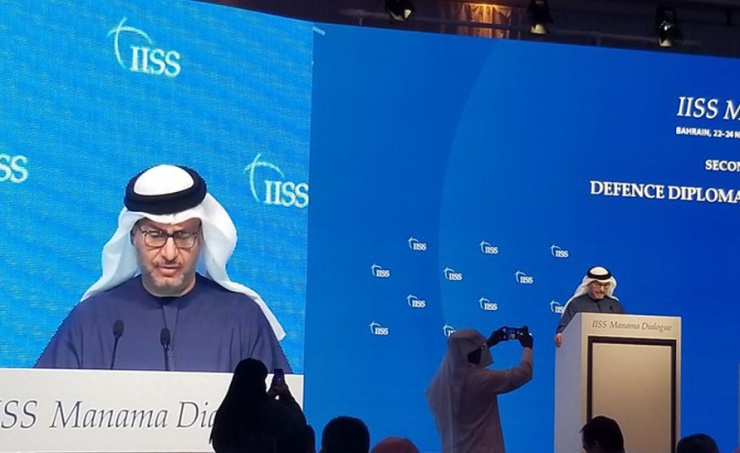ID :
550473
Sun, 11/24/2019 - 02:23
Auther :
Shortlink :
https://www.oananews.org//node/550473
The shortlink copeid
Iran is pursuing path of death, darkness and destruction

Manama, Nov 23, 2019 (BNA): Iran has come under scathing attack from Adel Al Jubeir, Saudi Arabia’s Minister of State for foreign Affairs, who blamed Tehran’s leadership of treading the path of darkness, death, and destruction.
“The region is currently witnessing two competing visions i.e. the vision of light and the vision of darkness,” he said.
“The vision of light seeks development, better living standards, women and youth empowerment, technology … This what we have been doing in the Kingdom of Saudi Arabia and the other Gulf Cooperation Council (GCC) countries. The vision of darkness is based on sectarianism and division, destruction and death, and that is exactly what Iran has been pursuing in the Middle East.”
Al Jubeir, was speaking during the second plenary session of The IISS Manama Dialogue 2019, the 15th regional security summit held in Bahrain under the patronage of His Royal Highness Prince Salman bin Hamad Al Khalifa, the Crown Prince, Deputy Supreme Commander and First Deputy Prime Minister.
Al Jubeir, said that the effects of the competition between these two visions can be witnessed in some countries due to interference in the internal affairs of Lebanon, Syria, and the GCC.
The other panelists were Dr Anwer Gargash, the Minister of State of Foreign Affairs, UAE and Sir Mark Sedwill, National Security Advisor, Cabinet Secretary, Cabinet Office, UK.
“Appeasement simply cannot work with Iran. We hold Iran responsible for the attack on Abqaiq. We do not want war, but Iran needs to be held accountable. The question is whether Iran can abandon its ambition to propagate the revolution and respect sovereignty,” he said.
“Germany under Hitler, the Soviet Union, Iran today: revisionist states threaten international order. The key to stability is deterrence, and steadfast resolve by the international community that Iran must change. If not, sanctions must be increased, not loosened.”
With regard to sanctions on Iran, it never worked as the approach of developing ballistic missile by Iran is reflective of its very core of the Iranian policy of death, destruction and darkness, he noted.
“Many of us asked about dialogue with Iran or talks with Iran but how one could be engaged in dialogues or talks when Iran says every Shia is Iranian? In addition, how you can talk with a regime or country which calls for destruction of the others?” Al Jubeir wondered.
The Saudi minister was of the view that the sovereignty of each nation should be respected.
“The GCC has had nothing against the people as Iranians are great people and have a great history but the regime should behave and treat us on equal footings. Regarding the question whether sanctions should be removed or not, in our view, Iran’s sanctions have had never worked for the past 20 years as the regime had never respected the international law. If the Iran still fails to respond to sanctions positively, it should face more stringent sanctions,” he said.
“The Kingdom of Saudi Arabia wants to see Iran a prosperous and respectable nation but it has to abide by three things - to abandon destruction, respect sovereignty and comply with international law,” Al Jubeir said.
Dr Anwer Gargash, the UAE Minister of State of Foreign Affairs, in his speech said that no country in the region wants a full fledge conflict with Iran.
“However, all countries in the region should work together on building the new regional order, which will be difficult and challenging and we need to work on such an objective by working together,” he said.
“We need to work more proactively on Arab alliances, regional alliances, and like-minded nations to bring onboard to achieve better harmony.”
The UAE minister applauded the proactive discussions during the Manama Dialogue and said the talks on regional and strategic issues in the Gulf would help in bringing peace and prosperity in this region.
Dr Gargash while highlighting the salient features of new world order, admitted that fully stable world order is achieved very rarely.
“Growing divisions on critical international issues, such as Turkish, Iranian interference in the affairs of other countries, what kind of Middle East we need to inhabit and the question is how the Middle East can overcome the challenges,” he said.
The UAE minister recognized various strong systems of regional and international alliances as well as the role of Jordan, Morocco and other aspects of diplomacy.
“The Turkish invasion of Syrian territory is also an eye opener for the regional nations to work together to bring stabilization and create common grounds for achieving peace in Yemen.”
He also underlined the importance of containing hegemonistic designs of Iran, saying preventing Iran from hegemonistic designs by no means is declaring a full fledge confrontation, which no country in this region wants or affords.
Talking about the recent unrest in many countries, mainly Lebanon and Iraq, he said the regional governments need to put in place good governance, fight corruption and ensure efficacy.
They are a must to address unrest among the citizens in many countries where protests have flared up due to bad governance and prevalent corruption.





